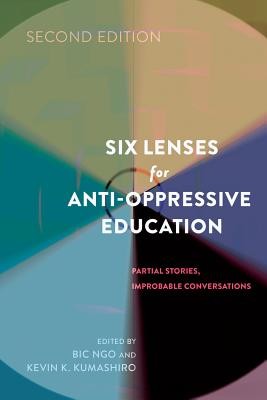
- We will send in 10–14 business days.
- Publisher: Peter Lang Inc., International Academic Publishers
- Year: 2014
- Pages: 332
- ISBN-10: 1433126109
- ISBN-13: 9781433126109
- Format: 15 x 22.6 x 2 cm, softcover
- Language: English
- SAVE -10% with code: EXTRA
Six Lenses for Anti-Oppressive Education (e-book) (used book) | bookbook.eu
Reviews
Description
This book spotlights six themes or «lenses» for understanding and analyzing education and its relation to oppression and anti-oppressive transformation. It brings together multiple perspectives on anti-oppressive education from various contexts, including K-12 schools, teacher education programs, postsecondary institutions, and community-based organizations. The book provides an array of practical and theoretical resources for educators to explore and innovate ways to confront and dismantle racism, sexism, classism, heterosexism and other forms of oppression in education. Significantly, this 2nd edition boasts ten new chapters as well as new or considerably revised Conversations for each of the six Parts. The chapters provide readers with diverse perspectives for considering anti-oppressive education from a range of content areas in K-12, postsecondary, and community contexts; student and educator populations; social differences; activities; and research methodology. In addition, this new edition significantly amplifies the perspectives and experiences of youth, including those from Southeast Asian, South Asian, and African American communities.
EXTRA 10 % discount with code: EXTRA
The promotion ends in 11d.19:37:16
The discount code is valid when purchasing from 10 €. Discounts do not stack.
- Publisher: Peter Lang Inc., International Academic Publishers
- Year: 2014
- Pages: 332
- ISBN-10: 1433126109
- ISBN-13: 9781433126109
- Format: 15 x 22.6 x 2 cm, softcover
- Language: English English
This book spotlights six themes or «lenses» for understanding and analyzing education and its relation to oppression and anti-oppressive transformation. It brings together multiple perspectives on anti-oppressive education from various contexts, including K-12 schools, teacher education programs, postsecondary institutions, and community-based organizations. The book provides an array of practical and theoretical resources for educators to explore and innovate ways to confront and dismantle racism, sexism, classism, heterosexism and other forms of oppression in education. Significantly, this 2nd edition boasts ten new chapters as well as new or considerably revised Conversations for each of the six Parts. The chapters provide readers with diverse perspectives for considering anti-oppressive education from a range of content areas in K-12, postsecondary, and community contexts; student and educator populations; social differences; activities; and research methodology. In addition, this new edition significantly amplifies the perspectives and experiences of youth, including those from Southeast Asian, South Asian, and African American communities.


Reviews